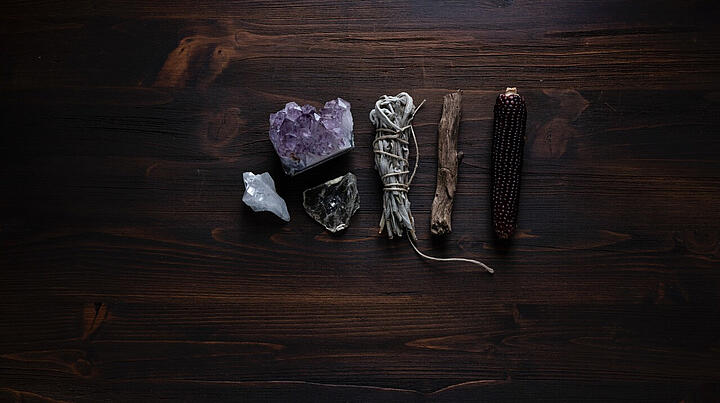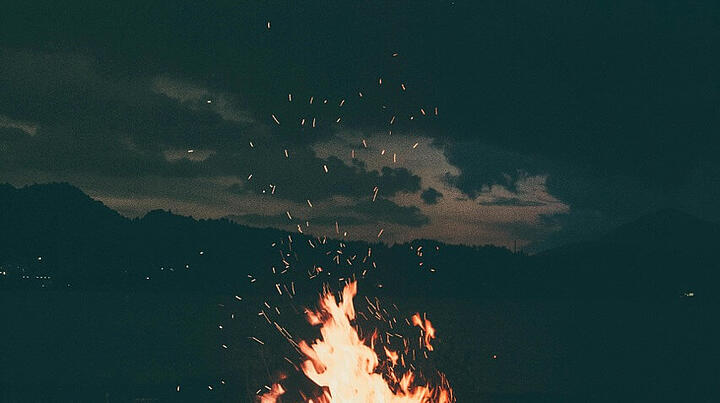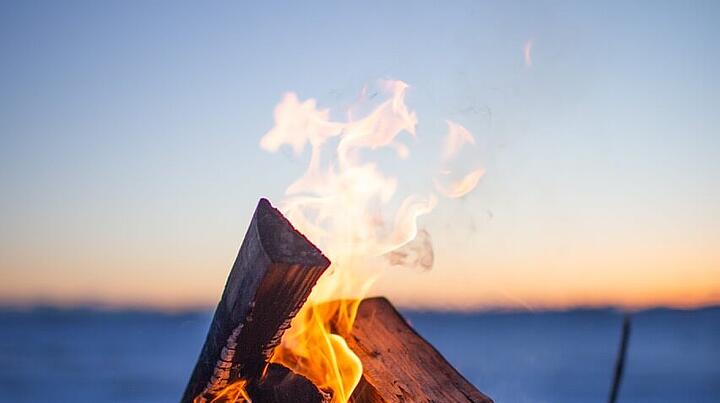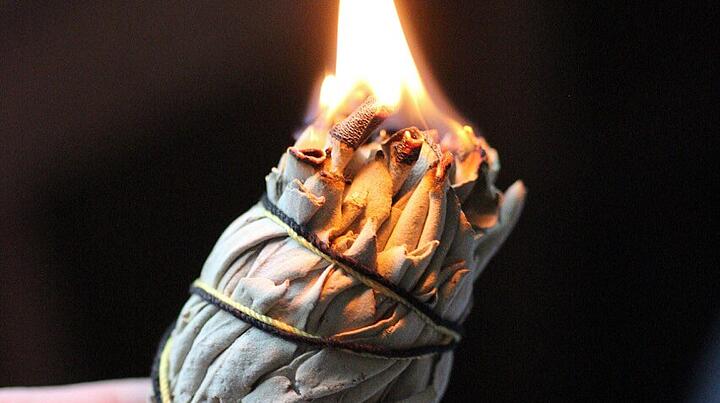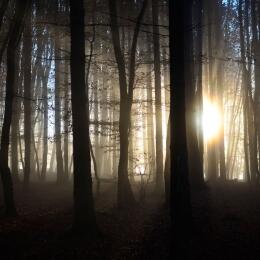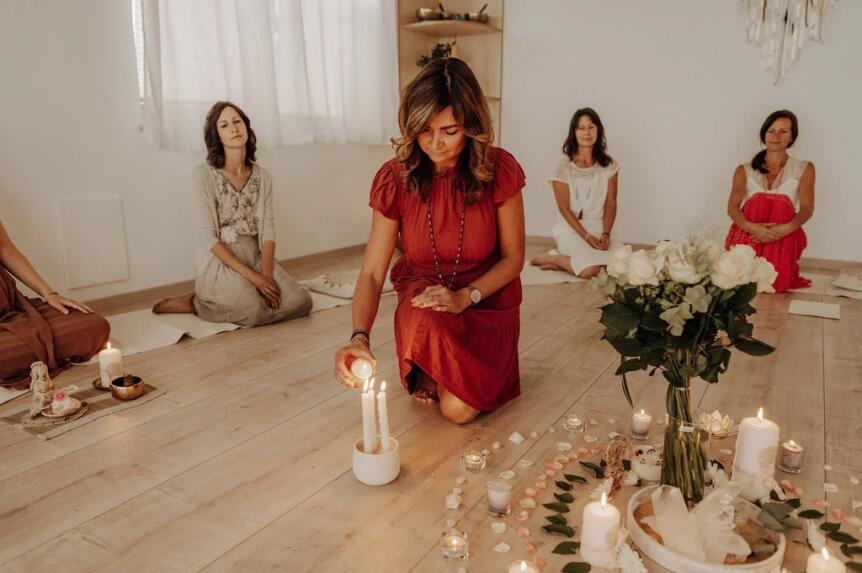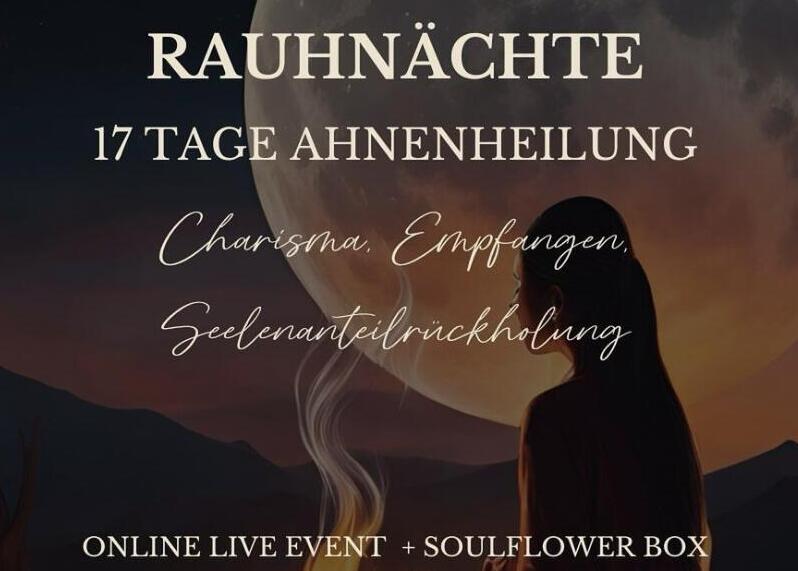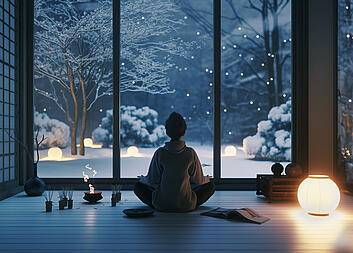What are the Rauhnächte and where do they come from? //
The Rauhnächte also known as the Twelve Sacred Nights, are a mystical and transitional period that traditionally spans from the night of December 24 to January 6. This time has deep roots in European folklore and was considered a liminal phase in which the veil between the physical and spiritual worlds becomes thinner. It's a time associated with introspection, ritual, and spiritual guidance.
The name Rauhnächte is thought to derive either from the German word - rau(h) - (meaning rough or hairy) - possibly referring to wild, beast-like spirits of old legends - or from Räuchern, which means to smoke or smudge. Traditionally, people would burn herbs and resins to cleanse their homes and drive away negative energies during these nights.
Each of the twelve nights is believed to correspond to a specific month of the coming year. For example, the first night stands for January, the second for February, and so on. The dreams, signs, and thoughts you have during each of these nights are seen as symbolic or prophetic messages for that month.
In modern times, the Rauhnächte are being rediscovered by people seeking spiritual depth, personal reflection, and connection to the rhythms of nature. It's a time to slow down after the holidays, turn inward, and let go of the past in order to set meaningful intentions for the future. Journaling, dreamwork, meditation, and candle rituals are just some of the practices people use to mark these special nights.
Whether approached from a folkloric, spiritual, or psychological perspective, the Rauhnächte offer a powerful opportunity to connect with the unseen, listen within, and prepare consciously for the year ahead.
Raunacht or Rauhnacht - which spelling is correct? //
Both spellings, - Raunacht - and - Rauhnacht - are used in German and considered correct, though Rauhnacht is more widespread in contemporary use. The origin of the term is somewhat unclear, and that may be why variations exist.
One theory traces the word back to rauch or räuchern meaning smoke or smudging. This relates to the ancient custom of burning herbs or resins to purify homes and ward off spirits during the twelve nights. Another interpretation links it to the word rau or rauh meaning rough or hairy, pointing to the wild, beastly figures in folklore-like Perchten or the Wild Hunt-that were believed to roam the land during this time.
Both spellings evoke deep-rooted mythologies and customs, and the difference is mostly regional or stylistic. In Austria and parts of Southern Germany, Raunacht is often used, where as Rauhnacht dominates in Northern and Western German-speaking areas, as well as in spiritual literature.
For English texts, “Rauhnächte” has increasingly become the standard transliteration, especially in spiritual and wellness communities. Whichever version you use, the meaning remains the same: it's a sacred, magical period filled with symbolism and ritual.
So don't worry too much about the “correct” spelling-what's more important is the intention and awareness you bring into this powerful time.
What do the 12 Rauhnächte represent? //
The 12 Rauhnächte, also known as the Twelve Sacred Nights, are believed to represent the twelve months of the coming year. Each night-starting around December 24 or 25-corresponds symbolically to a specific month: the first night to January, the second to February, and so on until the twelfth night, which represents December of the following year.
People traditionally pay close attention to dreams, emotions, signs, and even the weather during each Rauhnacht, interpreting these as foreshadowing events or energies for the matching month. For example, a peaceful and joyful dream on the third night might indicate a calm and harmonious March.
This symbolic connection allows people to read the upcoming year through spiritual reflection, intuition, and inner guidance. Many keep a Rauhnächte journal to write down what they observe each night. These notes can later be revisited throughout the year for insights and alignment.
Beyond the calendar symbolism, the 12 nights are also seen as a period of spiritual cleansing, intention setting, and connecting to ancestral wisdom. By consciously observing each night, people align themselves more intentionally with the cycles of nature and time.
When do the Rauhnächte start and end in 2025? //
In 2025, the Rauhnächte traditionally begin on the night of December 24 and end on the night of January 5, with January 6 (Epiphany) often seen as the conclusion and time of reflection.
Some traditions-especially in Central Europe-start counting from December 25, making the first Rauhnacht the night of Christmas. Others begin on December 21, the Winter Solstice, and extend the period accordingly. However, the 24 December to 6 January window remains the most commonly accepted and practiced version.
Each of the 12 nights between these dates represents a month of the coming year, so participants will often perform small rituals, journal, observe dreams, or practice intentional silence each night to receive insights for each corresponding month.
The nights are seen as a threshold between the old and new year-a time outside of time. Many people pause from daily routines to make room for introspection and spiritual connection during this phase.
For 2024-2025, here's a simplified list:
Dec 24 → Jan (1st night)
Dec 25 → Feb (2nd night)
...
Jan 4 → Dec (12th night)
Jan 5-6 → Integration and closing
How long do the Rauhnächte last and what does each night mean? //
The Rauhnächte traditionally last for 12 nights and 13 days, starting on December 24 and ending on January 6. Each night is said to correspond to one of the twelve months of the upcoming year. For instance, the first Rauhnacht represents January, the second February, and so on.
Here's a general overview:
- 1st Night (Dec 24): January - Foundations and new beginnings
- 2nd Night: February - Inner peace and intuition
- 3rd Night: March - Courage and self-expression
- 4th Night: April - Healing and growth
- 5th Night: May - Joy and abundance
- 6th Night: June - Relationships and harmony
- 7th Night: July - Power and transformation
- 8th Night: August - Clarity and truth
- 9th Night: September - Gratitude and learning
- 10th Night: October - Letting go and reflection
- 11th Night: November - Mystery and depth
- 12th Night: December - Completion and wisdom
Each night is an invitation to reflect, observe your dreams, set intentions, and release old patterns. Many people also add a 13th day (Jan 6) as a summary or review day, connecting the spiritual messages as a whole.
Which Rauhnacht is today - how do I keep track? //
To know which Rauhnacht it is today, start counting from the night of December 24 to 25. That night represents the first Rauhnacht, symbolising the month of January. The next night (Dec 25 to 26) stands for February, and so on, ending with the night of January 4 to 5, which corresponds to December of the coming year.
Here's a quick reference:
- Dec 24-25 → January
- Dec 25-26 → February
- Dec 26-27 → March
- Dec 27-28 → April
- Dec 28-29 → May
- Dec 29-30 → June
- Dec 30-31 → July
- Dec 31-Jan 1 → August
- Jan 1-2 → September
- Jan 2-3 → October
- Jan 3-4 → November
- Jan 4-5 → December
- Jan 6 → Integration / Closing
To stay organised, many people use a printed Rauhnächte calendar, a special journal, or even a mobile reminder system. You might also prepare daily prompts or themed cards that guide you through each night.
Keeping track is not about pressure, but about presence. Whether you spend 10 minutes or an hour each night, tuning in to the energy and writing down your experiences makes the process meaningful and memorable.
How can I prepare for the Rauhnächte? //
Preparing for the Rauhnächte means creating physical, mental, and emotional space for a spiritual transition. It's less about perfection and more about intention.
Here are key preparation steps:
- Clear your space: Clean your home before December 24. Let go of clutter and unfinished business.
- Reflect: Write down what you want to leave behind from the past year - habits, fears, regrets.
- Gather tools: Prepare a journal, candles, incense, a blanket, oracle cards, or any spiritual tools you enjoy.
- Mark your calendar: Set aside quiet time each evening between December 24 and January 5.
- Optional rituals include setting up a small altar, preparing herbal teas, or printing 13 small wish notes - one for each night, with the last one symbolising what you must manifest on your own.
In essence, you are clearing the path so that intuition, insight, and clarity can enter. The Rauhnächte are a portal for listening inwardly, and preparing in advance allows you to step into that space with calm and focus.
What do people do during the Rauhnächte? //
People use the Rauhnächte for spiritual reflection, ritual, and intention-setting. Activities vary depending on personal beliefs and traditions, but common practices include:
- Journaling: Write about your day, dreams, feelings, and intuitions.
- Dreamwork: Keep a dream journal and look for symbolic patterns.
- Candle or incense rituals: Light a candle or smudge with herbs to symbolise cleansing and insight.
- Pulling cards: Use oracle or tarot decks to receive messages for each month.
- Meditation: Spend time in silence or with guided meditations.
- Writing intentions: Write down what you want to invite in each month.
- Some also observe silence for parts of the day or go offline to deepen their presence. What matters most is the conscious slowing down and honouring this time outside of time.
The Rauhnächte are not a checklist, but a sacred container for stillness and clarity. Whatever ritual you choose, make it meaningful and aligned with your inner rhythm.
When should incense be burned during the Rauhnächte? //
Incense or smudging is traditionally done every night during the Rauhnächte, usually in the evening or before going to bed. The ritual involves burning sacred herbs or resins to cleanse the energy of your home and invite peace, clarity, and spiritual presence.
Here's how you can do it:
- Choose your herbs or blends: Common options include mugwort (cleansing), frankincense (divine connection), pine (grounding), lavender (calm), or a custom Rauhnächte mix.
- Light a charcoal disc or smudge stick.
- Walk slowly through each room while focusing on your intention (e.g. letting go, clarity, protection).
- Visualise negative energy dissolving and blessings filling the space.
- Open a window afterwards to release the smoke.
- Some people smudge only on the first, sixth, and last night, while others do it daily. There's no strict rule-follow your intuition.
This simple act connects you with ancient traditions and creates a clean, sacred space to reflect and dream.
What should and shouldn't you do during the Rauhnächte? //
What you should do:
- Reflect on the past and set intentions for the future.
- Record your dreams and emotions.
- Spend time in silence or nature.
- Honour your intuition and rest deeply.
- Light candles and use incense or herbs to purify your space.
What to avoid:
- Cleaning, washing clothes, or sewing (traditionally believed to disturb spiritual energies).
- Engaging in conflict or negativity.
- Making impulsive decisions or starting new major projects.
- Being overly busy or distracted.
- The idea is not superstition but mindful living. By avoiding routine habits and creating space for quiet, you allow deeper insights and symbolic guidance to emerge.
The Rauhnächte are about turning inward. Let go of external pressure and embrace stillness, observation, and intention.
Why is washing or cleaning discouraged during the Rauhnächte? //
This tradition comes from ancient beliefs that the veil between worlds is thinner during the Rauhnächte. Actions like washing clothes or cleaning the house were thought to “stir up” spirits, interrupt the sacred silence, or entangle the threads of fate.
For example, it was believed that hanging wet laundry might tempt or offend passing souls or ancestors, or that sweeping could remove blessings or stir misfortune.
In modern terms, these prohibitions can be seen as metaphors. They remind us to pause from routine, allow energy to settle, and treat this time as sacred. It's about stepping out of control mode and embracing receptivity.
So while it's not dangerous to do laundry during this time, choosing not to becomes a conscious ritual of slowing down and aligning with inner rhythms.
What should I do with my Rauhnächte notes and reflections afterwards? //
Your notes from the Rauhnächte are like spiritual blueprints for the year ahead. Each entry carries insight, energy, and subtle messages linked to the corresponding month.
After January 6, you can:
- Review each entry monthly to reconnect with your guidance.
- Highlight recurring themes to track personal growth.
- Create affirmations or intentions based on what came up.
- Turn your journal into a vision board, blog series, or creative project.
- Keep everything private, treating it like a sacred text.
- The key is to honour what came through. You don't need to interpret every symbol immediately-some insights unfold gradually throughout the year.
Your journal becomes a companion on your journey, reminding you that you began this cycle with presence and purpose.




